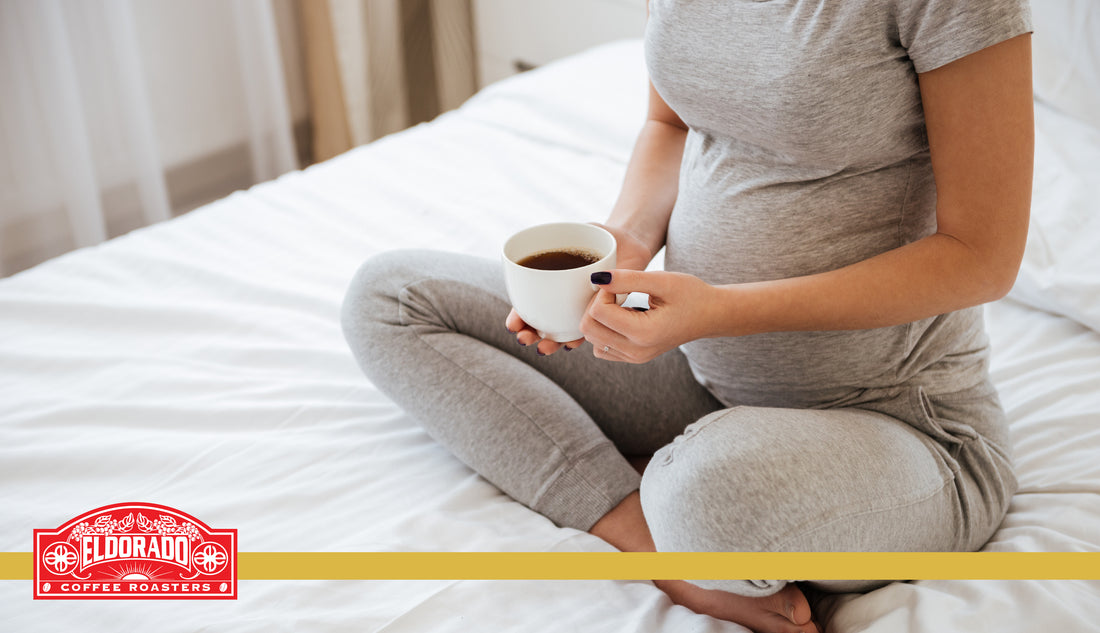
Is It Safe To Drink Coffee During Pregnancy?
Share
There are a lot of changes you’ll make as a mom. But, does drinking coffee have to be one of your sacrifices? Is it safe to drink coffee while you’re pregnant?
New moms especially need coffee. That exhaustion hits a whole new level: You might be struggling with fatigue due to hormones, or you’re expecting another child with a toddler running around, while working and handling a million things at once. Plus, you’re probably craving something calming, relaxing, and familiar, like your favorite cup of morning java.
We’re here to share some good news. You do not have to give up coffee while you’re pregnant. You can still indulge in a little pumpkin spice latte, cold brew, or shot of espresso, in moderate amounts.
Is caffeine safe during pregnancy?
Caffeine is safe during pregnancy in moderation.
The American College of Obstetricians and Gynecologists (ACOG) reports that it is safe to consume less than 200mg of caffeine per day, without any notable side effects for mom or baby. There may even be some health benefits to drinking moderate amounts of coffee.
What happens if you drink too much caffeine while pregnant?
ACOG states that drinking more than 200mg of caffeine per day could show some negative effects while pregnant. Studies have shown that caffeine crosses through the placenta, which means it can affect the baby’s health. In serious cases, high caffeine consumption may cause a greater risk of miscarriage and low birth weight.
Also, pregnant women metabolize caffeine at a slower rate. It can take anywhere from 1.5 to 3 times longer to eliminate caffeine from the body. This means caffeine is circulating longer, which may have a “stressing” effect on the baby. One study even suggested that extreme caffeine use in early pregnancy might stress the baby enough to cause behavioral disorders later in life.
This slow metabolizing of caffeine may also have a negative effect on the mom, too. Some pregnant women can get unpleasant side effects from consuming high quantities of caffeine, such as:
- High blood pressure
- Rapid heartbeat
- Increased anxiety
- Dizziness
- Restlessness
- Abdominal pain
- Diarrhea
- Dehydration
Regardless, you want to be more aware of your health when you’re pregnant. Take note of what you eat and drink to see how your body reacts. If your body doesn’t seem to experience side effects with caffeine, you can stick to drinking 200mg of caffeine. But, if you start seeing side effects, you might want to make the personal choice to cut out, or minimize, caffeine for the time being.
Asking what happens when you drink too much caffeine while pregnant is like asking what happens when you do too much of anything while pregnant. Moderation is key!
Big note—The ACOG recommends no more than 200mg of caffeine per day. That includes caffeine from coffee, tea, energy drinks, and other sources. So, if you drink a cup of coffee, you’ll want to avoid other sources of caffeine for the day. You also want to be aware of all the “extras” you put in your coffee, like added sugars or artificial sweeteners, which may also have effects on pregnancy.

Does the trimester matter?
Is caffeine during pregnancy worse in the second trimester? Is early pregnancy caffeine the worst? Will caffeine affect my pregnancy in third trimester?
By the time you get to the third trimester, you’re probably dying for a cup of coffee. But in early pregnancy, caffeine might feel especially vital to maintaining some semblance of normalcy. So does it matter when you drink your cup?
Timing may matter. It seems early pregnancy caffeine may have a greater effect than caffeine during pregnancy in the second trimester or third trimester.
Studies have suggested that drinking higher amounts of caffeine earlier in the pregnancy may have worse effects than caffeine consumption in the third trimester. The risk of miscarriage is higher in the first and second trimesters, and higher caffeine consumption may elevate this risk. Studies also show a strong association between caffeine intake in the first trimester, and late miscarriage or stillbirth later in the pregnancy.
Still, you shouldn’t up your caffeine consumption in the third trimester. Although there seem to be fewer serious risks, researchers still aren’t entirely sure of the effect of caffeine on a developing fetus or child. It’s generally recommended to keep the consumption below 200mg for the duration of the pregnancy.
How much coffee is 200mg of caffeine?
The amount of caffeine in your coffee will depend on the source and the brew (and, of course, how much coffee you consume).
Espresso has the highest caffeine content, followed by nitro cold brew coffee, cold brew coffee, brewed coffee, drip coffee, then instant coffee. Eight ounces of drip coffee will have 70-140mg of caffeine, while 1.5 ounces of espresso has 60-80mg of caffeine. So, a double shot of espresso (two ounces) is equivalent to about one cup of drip coffee.
In general, the roast of the coffee doesn’t matter much (light roast only has slightly more caffeine than dark roast). However, the type of bean does matter. Arabica and Robusta beans are the most common coffee beans. Robusta generally has more caffeine content than Arabica—sometimes up to twice as much caffeine. Colombian beans aren’t as widely used, but they’re also fairly high in caffeine. So, take note of the bean type as well.
Of course, you also want to be aware of the size of your cup. You’ll consume more caffeine if your mug holds more coffee. So you may want to start measuring your coffee amounts more closely, or stick to a coffee cup you know is the right size for your brew.
As a general rule of thumb, expectant mothers can have about 10 ounces of brewed or drip coffee per day, or one to two shots of espresso. (Psst… We sell decaf espresso, so you can enjoy your fave espresso with less caffeine!)
Psst… Just to put it in perspective. A Starbucks grande brewed coffee is 16 ounces, and contains over 330mg of caffeine. That’s already over your daily max. So, it’s not as much coffee as you think!

Go for the latte
If you’re going to drink coffee, we recommend choosing a latte. In general, lattes give you a sizable portion of liquid to sip on, but you’re generally drinking less coffee (usually around a shot or two of espresso).
Plus, using milk in lattes can provide calcium and protein that might help your baby grow. Some non-dairy milk alternatives can also provide vitamins and nutrients to your diet that can be beneficial during pregnancy.
What about decaf coffee during pregnancy?
This might surprise you, but decaf coffee still has caffeine in it! In an eight-ounce cup of decaf brewed coffee, there can be up to 15mg of caffeine. It’s a lot less than regular coffee, but you’ll still want to keep a watch on caffeine intake if you’re drinking multiple cups (or a huge mug) in a day.
You can have decaf coffee during pregnancy—Just don’t get crazy with it.
Drink water
Expectant mothers should drink more water than usual. It’s easier to get dehydrated because of all of the circulating hormones. Your body is making another person, so it needs a little extra water and nutrients!
Caffeine can be a diuretic, which means it pulls water out from the body and expels it in your urine. This can make you more dehydrated, especially during pregnancy.
So, make sure you drink plenty of water, especially alongside your consumption of coffee.
Pro tip—Drink filtered water, and use filtered water for your drip coffee. Filtered water removes unhealthy minerals and chemicals that you don’t want for yourself or your baby. Making your coffee drinks at home is a good option that allows you to regulate exactly how much caffeine you’re consuming.
Should I drink coffee while pregnant?
To wrap it up, ACOG reports that it is safe to drink less than 200mg of caffeine per day while pregnant, or hoping to become pregnant. You want to be aware of the source and amount of your caffeine, including different drinks (tea, soda, etc.) as well as roast and brew of coffee.
You don’t have to give up your favorite cup of java, but it’s definitely smart to err on the side of caution. There isn’t enough research to prove or disprove the safety of caffeine during pregnancy, so keep it in moderation. Better yet, go for a decaf cup of coffee during pregnancy to get that delicious coffee flavor without heightened risk.
Be wise, be moderate, and be healthy!
